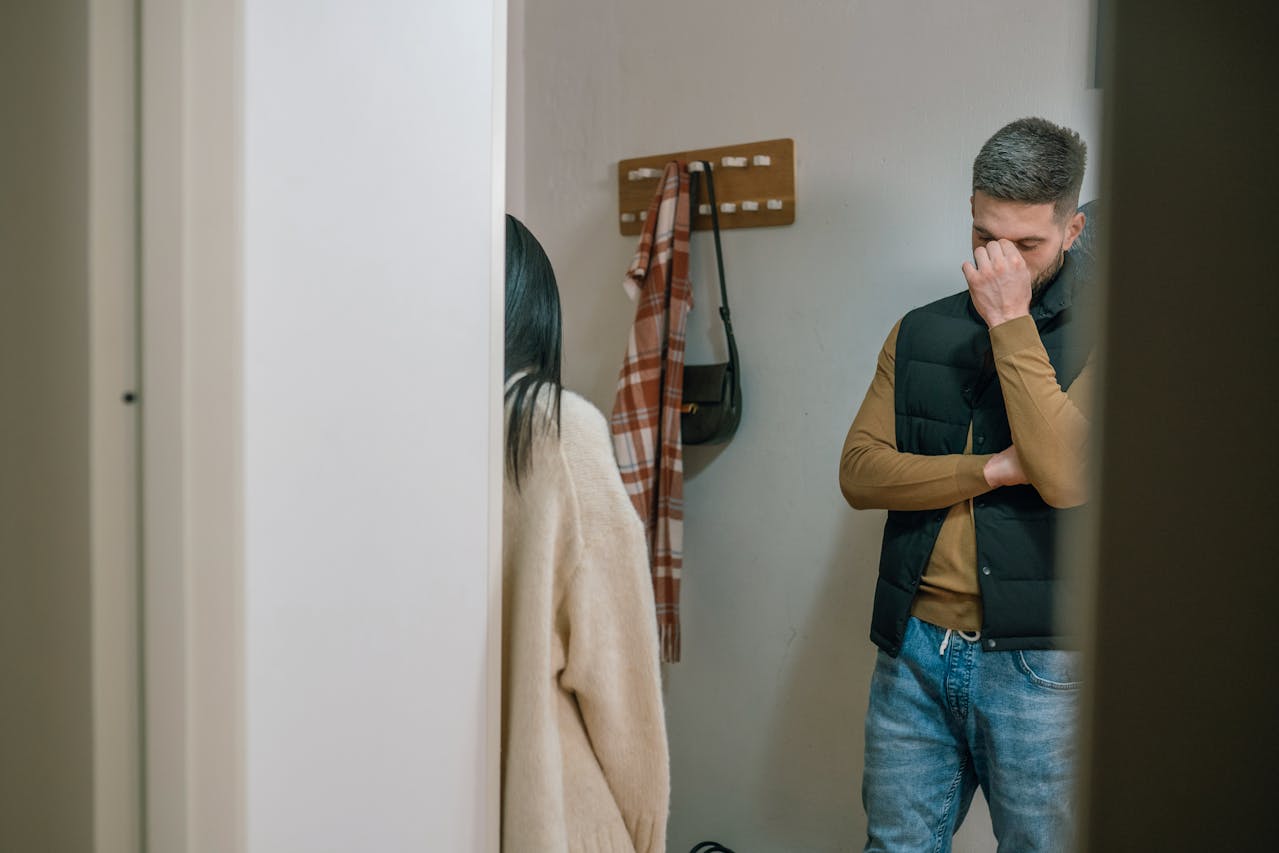Do you ever wonder whether the way you worry is normal? Do you question whether you are worrying or whether you might have signs of anxiety? Perhaps your worrying could lead to anxiety. The good news is that everyone worries.
You worry about health, money, career, and family. Worry is most commonly a temporary response of fear to these thoughts. But when you find the worry lingers for a long time and you start feeling overwhelmed with fear, it could be one of the signs of anxiety.
Common Signs of Anxiety to Watch For

Anxiety is when the worry doesn’t stop, and it starts affecting your everyday life. Panic sets in and you struggle to control the thoughts and your body’s response to these thoughts.
These signs of anxiety start to interfere with job performance, friendships, relationships, schoolwork, and your overall health. The following signs of anxiety are indicators of whether you are experiencing anxiety and how it could affect you. Santa Clarita Christian Counseling offers faith-based support to help individuals manage anxiety, develop healthy coping strategies, and regain a sense of peace and balance in their lives.
Nervousness, restlessness, and tension
To worry makes you nervous, but to be consistently anxious creates muscle tension in your body. Your body is hardened, tensed, and restless. You are constantly fidgeting and uncomfortable. You struggle to relax even when you set the mood for a relaxing evening. You try to rest while on a holiday or a weekend break, but you struggle to let go of the tension in your body.
What you don’t realize is that the body gets tenser and tenser while we have these anxious thoughts. When you become aware of your anxious thoughts, you find that your shoulders are pulled up close to your ears. You must intentionally lower your shoulders for your body to stop this tension. Before you know it, you realize that your body has tensed up again.
Due to the tension in the body, you struggle to find a comfortable seating position or sometimes even a position that is comfortable to sleep in. This is hardly ever due to a lack of support on the couch or bed, but purely the fact that the tension in the body makes our muscles sensitive to touch and less flexible. Lactic acid is created by the body when the muscles use energy. Lactic acid, unfortunately, contributes to a lot of stiff, tense, and cramping muscles in your body.
Easily fatigued

Anxiety takes a physical toll on the body. The constant worry and thinking about a variety of things that you cannot control is very tiring. Due to you feeling high-strung every day, your energy levels are always at a low. Your mind, your body, and your emotions cannot catch a breather.
Anxiety creates false indicators to your body that it needs to protect itself. This leads to muscle tension, overthinking, and quite often an overreaction to any situation you are faced with. Other signs of anxiety that contribute to fatigue are lack of sleep, constant increase in heart rate and breathing rate, and muscle tension.
Difficulty concentrating
The feelings of anxiety start to cloud every thought. While working, these thoughts seem to find a way into every train of thought. You try to focus on the project at hand, but thoughts and feelings of worry take over.
Anxiety levels rise when you think about your current job circumstances, the current conflict you are facing, your lack of or conflict in relationships, any financial strain, and the pressure caused by expectations. Other signs of anxiety like sleep problems, restlessness, fatigue, and anxiety attacks all contribute to the difficulty to concentrate on the tasks at hand.
Struggling to control feelings of worry.
When you try to think about other topics that do not give you anxiety, it all reverts to those thoughts that give your anxiety. You try to have a conversation with a friend about a trip they took for a nice holiday and the tone soon changes into your concerns and all the things that make you anxious when thinking of traveling. You lose control of the anxious thoughts.
Increased heart rate
When the body faces any stressful situations, the body uses the fight-or-flight response to cope with the stress. Your body will either fight or flee from the situation that is stressful or that makes you anxious. During the fight reaction,  there is an increase in the heart rate, an increase in breathing, and an increase of blood to the heart and muscles to fight against the danger.
there is an increase in the heart rate, an increase in breathing, and an increase of blood to the heart and muscles to fight against the danger.
The heart rate increases as the heart needs to pump more blood that is filled with oxygen to the lungs and muscles. Without this increase in heart rate, breathing rate, and blood flow to the heart and muscles, the body cannot fight and protect itself from any danger. The body uses the same process to flee from danger.
If this process takes place too often due to anxiety, it places the heart under tremendous stress. This could have other negative long-term effects on the heart. Some doctors believe that the negative long-term effects of anxiety on the heart can contribute to heart disease, heart attacks, and strokes.
Rapid breathing (hyperventilation)
Together with the increased heart rate, the body must increase the breathing rate. The harder the heart works to pump the blood to the rest of the body, the harder our lungs work to put oxygen into the blood. The body also needs to get rid of carbon dioxide faster.
With an increased breathing rate, the breaths become shallow to breathe faster. This is not the ideal way for your body to get oxygen as shallow breathing is harder work for the body than taking slow and deep breaths.
As the body wants more and more oxygen, shallow breaths can often impede the body from getting enough oxygen. You start to take shorter and faster breaths. The breaths become less effective, and you start hyperventilating. You struggle to calm your heart rate and take deep breaths. This is most common when panic attacks can take place.
Avoiding triggers
Signs of anxiety will make you feel constantly on edge. Being on edge makes you more alert to sounds and visuals. You are reminded of things that previously made you feel anxious. A loud sound reminds you of a previous car accident.

Bright light makes you feel like a headache is starting. A phone ringing reminds you of an uncomfortable conversation. Driving in traffic reminds you of being in a small, cramped space. When situations like these, make you feel anxious again, you will try to avoid them in the future to avoid the feeling of anxiety.
You start avoiding group projects at school or work to avoid being uncomfortable. You start avoiding meeting new people on the off chance that conflict could arise. It starts to impact your education, career, and personal life.
Sleep difficulty
It’s not easy to fall asleep when you are flooded with anxiety. Other signs of anxiety noted above can also contribute to unsatisfactory sleeping patterns. The tension and overthinking make it impossible for you to fall asleep. Your thoughts race from here to there.
You try to calm your thoughts by laying still and taking deep breaths, but the thoughts won’t stop running around. It can often take hours to fall asleep. Some mornings you might wake up at three or four am. Your internal clock wakes you up as you are anxious to oversleep and miss work. This can even happen over the weekend.
Thinking of the future
The future and the unknown will most likely cause you anxiety. It’s not just the unknown that causes anxiety, but also what could be. Anxiety causes you to think of all that could go wrong. The positive thoughts that usually would cause excitement disappear and you are overflowed with anxious thoughts.
People often think that anxiety is only for those who allow themselves to be emotional and vulnerable to the world. But this could not be any further from the truth. Anxiety does not see race, culture, class, or gender.
Anxiety is not just for a specific stereotype created by society. We are all susceptible to the impact anxiety could have on us. We often don’t see it coming until we feel like we are spinning out of control.
The good news is that if you have read this article, you have possibly identified whether you are struggling with some of these signs of anxiety. Once the issue has been identified, you can find out how to overcome them. For guidance to deal with and prevent anxiety, contact Santa Clarita Christian Counseling to find a counselor who can assist you with your needs
“White Flowers”, Courtesy of Sergey Kvint, Unsplash.com, CC0 License; “White Flowers and Fence”, Courtesy of Annie Spratt, Unsplash.com, CC0 License; “Purple Flowers”, Courtesy of Annie Spratt, Unsplash.com, CC0 License; “White Flower”, Courtesy of Hello I’m Nik, Unsplash.com, CC0 License
-
Kate Motaung: Curator
Kate Motaung is the Senior Writer, Editor, and Content Manager for a multi-state company. She is the author of several books including Letters to Grief, 101 Prayers for Comfort in Difficult Times, and A Place to Land: A Story of Longing and Belonging...
DISCLAIMER: THIS ARTICLE DOES NOT PROVIDE MEDICAL ADVICE
Articles are intended for informational purposes only and do not constitute medical advice; the content is not intended to be a substitute for professional medical advice, diagnosis, or treatment. All opinions expressed by authors and quoted sources are their own and do not necessarily reflect the opinions of the editors, publishers or editorial boards of Stone Oak Christian Counseling. This website does not recommend or endorse any specific tests, physicians, products, procedures, opinions, or other information that may be mentioned on the Site. Reliance on any information provided by this website is solely at your own risk.





